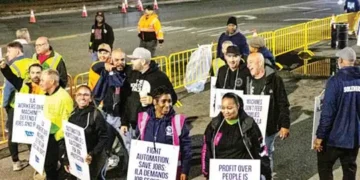Blitz Bureau
NEWARK: About 45,000 port workers represented by the International Longshoremen’s Association (ILA) began walking off the job after their contracts expired at midnight on October 1, leaving some of the busiest ports in the US crippled. As many as 36 ports along the east and Gulf coasts were affected.
Talks break down
They typically handle about half of the nation’s ocean shipping. Talks over a new contract between the ILA and the United States Maritime Alliance (USMX) have broken down, and the union dismissed a last-ditch offer from operators hours before the strike was due to begin.
The strike – the first by port workers strike on the US east coast since 1977 – threatened to shut down ports from Maine to Texas, mangling supply chains and straining the US economy.
As workers joined picket lines at ports including Philadelphia, Houston and Virginia in the early hours, economists have warned that failure to end the strike swiftly could lead to shortages and higher prices.
President Joe Biden directed officials to tell both sides “that they need to be at the table and negotiating in good faith – fairly and quickly”, the White House said. Negotiators on both sides have accused the other of refusing to bargain. The ILA has argued that USMX, which represents 40 ocean terminals and port operators, has “low-balled” offers on wage raises for workers and accused it of violating the previous contract by introducing automation at several US ports.
$5 bn loss a day
It is estimated the strike will cost the economy as much as $5bn a day. The union has said it will still handle military cargo, and that passenger cruise ships will be unaffected.
In Philadelphia, the local ILA president, Boise Butler, said the union would strike for as long as it needed to get a fair deal, and claimed that it had leverage over the companies. “This is not something that you start and you stop,” he told Associated Press. “We’re not weak,” he added, pointing to the union’s importance to the nation’s economy.
Shipping companies made billions during the pandemic by charging high prices, and “now we want them to pay back”, Butler added. “They’re going to pay back.”































